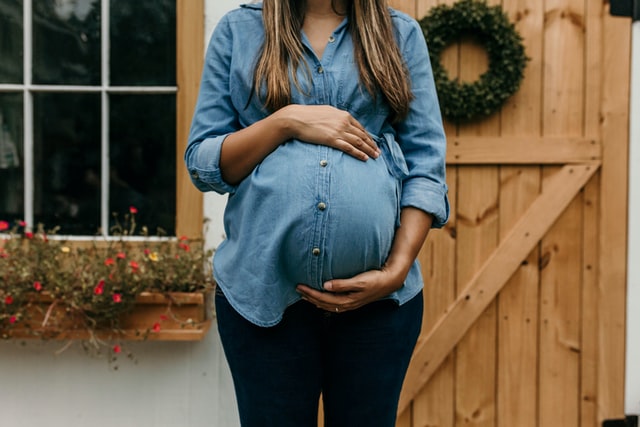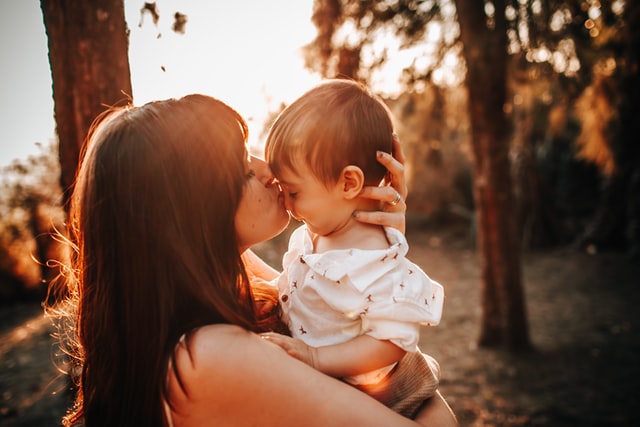The Journey into Motherhood
Becoming a mother and your mental health
Motherhood is a beautiful journey, but preparing for all the eventualities physically and mentally can be scary and confusing. This is an important time to bring your support network or your “village” together. It’s best to be prepared and have help if you need it.
On the podcast, I recently connected with the New Mommy Guru, Kristen O'Dell, a board-certified Family Nurse Practitioner, to discover motherhood and mental health. Kristen helps pregnant women learn about postpartum depression and anxiety before their baby is born so they can best recognize it if it happens and get help quickly.
Preparing not just for birth, but also for your mental health journey after birth, is important for every new mom.
It is often the partner of the new mom who notices something is off. It is just as important to educate partners and families about possible mental health issues, so mom can be safe and taken care of.
“Having children just puts the whole world into perspective. Everything else just disappears.”
- Kate Winslet
Normal motherhood changes
Kristen explained a little bit about normal changes that happen after women give birth. Because of the hormonal changes, mom will go through some physical and emotional shifts during the pregnancy and after the birth. This is called matrescence and is a perfectly natural transition into motherhood.
There may also be the added social pressures after birth. Mom may feel the overwhelm of taking care of a newborn as fear, doubt, guilt, or shame. She may also be coping with physical changes to her body that could cause uncertainty about extra weight, stretch marks, and birth trauma. This can lead to mom feeling quite isolated and alone.

And of course the structure of the family unit has changed with the addition of a baby. This can cause anxiety around parenting and the mom’s and partner’s role within the family. Identities need to be redefined, which can be a long and frightening process for parents. For first-time moms, moving from wife to mother may cause a sharp disconnect in their personal identity. This needs time and healing to be reconciled.
In general, women will move through matrescence with time. The process of settling into the motherhood role is interrupted so frequently with mundane things like doctor’s appointments, financial worries, trying to take care of older siblings, and the like. And it is normal for women to struggle with that shift in identity while continuing to do everything else that is expected of them. For almost everyone else, life continues on and things zip right along. Moms need time and space to “become” a mother.
Mental health and motherhood
What often gets overlooked or misdiagnosed are mental health complications that can creep up after giving birth. Kristen outlined the three mental health complications women could face as new moms.
For anything you experience, it is crucial to keep talking to your partner, your support network, other moms, and your doctor and/or midwife. We need to bring these complications into the spotlight and ensure women feel comfortable discussing them. Only then can help be provided in a timely manner when new moms need it.

Postpartum Blues
The postpartum blues are different from matrescence in that they are not part of the natural transition into motherhood. Having said that, the postpartum blues usually happen around four days after giving birth and resolve within a week. About 30-75% of women face the postpartum blues.
You might experience crying, sadness, unstable and depressed mood, irritability, anxiety, and insomnia. But, the symptoms should taper off on their own within a week. Generally, the postpartum blues do not impact your day-to-day functional capacity. You need to care for yourself during this time and ensure you have good social and medical support.
It is important to note that women who experience postpartum blues are at increased risk for developing PPD. A solid social support network and regular contact with your doctor and/or midwife is important to identify this early on, if it happens.
Postpartum Depression (PPD)
One of the difficulties surrounding PPD is the lack of agreement around how to define it. If you go see your doctor, they may look at depression that happens within a month of giving birth; however, sometimes postpartum depression can occur within a full 18 months after giving birth. This discrepancy is only part of why PPD remains under-diagnosed.
There is also the stigma attached to mental health complications. Many new moms are afraid of asking for help because they fear the consequences. They might be afraid of looking like a bad mom, or someone incapable of raising an infant. There could certainly be the fear that the baby may be taken away. It has also been suggested that doctors may not ask about a new mom’s mental health because they believe it could offend or embarrass them.

The symptoms of PPD are not that different from those for depression. They can include depressed mood, a loss of interest in daily activities, lower appetite and significant weight loss without dieting, insomnia or hypersomnia, psychomotor agitation or retardation, exhaustion, feelings of worthlessness or excessive guilt, inability to concentrate, recurrent thoughts of death, suicidal ideation, or even a suicide attempt. About 10-15% of women experience PPD.
There are also some medical conditions that can imitate symptoms of PPD. Those include hypothyroidism and anemia. If you are experiencing depressive symptoms, be sure to ask your doctor to run tests for both. That way they can be ruled out or addressed to help support you during your journey.
Postpartum Psychosis
This is the most severe of the postpartum complications and it is considered a psychiatric emergency. You may experience elated mood, changing rapidly with depressed mood, delusions and hallucinations, irritability, restlessness, sleep and/or disturbance, obsessive rumination about your infant, and disorganized behavior. About 0.1–0.2% of moms will experience postpartum psychosis.
It is possible that postpartum psychosis might be a manifestation of bipolar disorder. In any case, it is essential to seek immediate help. You can go to your local hospital emergency, or contact your doctor or psychiatrist if you are working with one.
The Takeaway
The journey to motherhood is amazing and life-changing. And as with any big changes in life, everyone experiences them differently. It is normal to feel uncertainty and some anxiety as you transition into being a mom. And it is normal to experience an identity shift and apprehension about what your new world looks like.
There are also mental health complications that may arise. In those cases, you need to have the support and care to help you heal. Whether that be your partner and family to ensure you grow into becoming a mother. Or, if needed, medical help to ensure you and your baby are safe and thriving.

Please understand that there is no shame in asking for help or in needing help.
We all reach the limit of our own resources at times and need support to carry on. And you may be surprised at how many moms may have needed the support and did not receive it. So, ask for it. Demand it. Because you do not have to do this alone.
You are creating the miracle of life and you deserve the help and support you need!
Sources
Alici-Evcimen, Y., & Sudak, D. M. (2003). Postpartum depression. Primary Care Update for OB/GYNS, 10(5),
https://thejornipodcast.com/episode-6-mental-health-and-motherhood-with-kristen-odell
